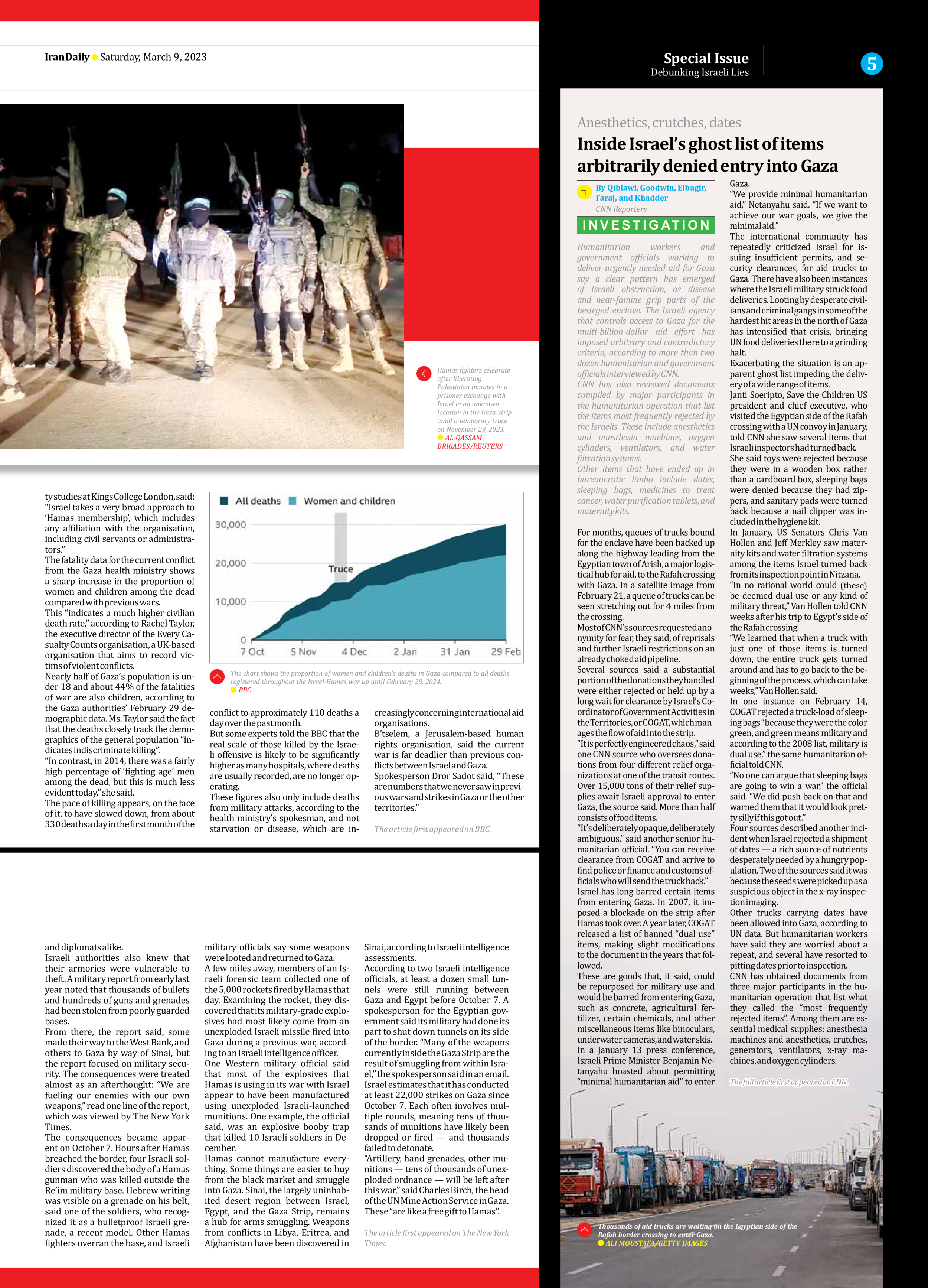
Anesthetics, crutches, dates
Inside Israel’s ghost list of items arbitrarily denied entry into Gaza
By Qiblawi, Goodwin, Elbagir, Faraj, and Khadder
CNN Reporters
Humanitarian workers and government officials working to deliver urgently needed aid for Gaza say a clear pattern has emerged of Israeli obstruction, as disease and near-famine grip parts of the besieged enclave. The Israeli agency that controls access to Gaza for the multi-billion-dollar aid effort has imposed arbitrary and contradictory criteria, according to more than two dozen humanitarian and government officials interviewed by CNN.
CNN has also reviewed documents compiled by major participants in the humanitarian operation that list the items most frequently rejected by the Israelis. These include anesthetics and anesthesia machines, oxygen cylinders, ventilators, and water filtration systems.
Other items that have ended up in bureaucratic limbo include dates, sleeping bags, medicines to treat cancer, water purification tablets, and maternity kits.
For months, queues of trucks bound for the enclave have been backed up along the highway leading from the Egyptian town of Arish, a major logistical hub for aid, to the Rafah crossing with Gaza. In a satellite image from February 21, a queue of trucks can be seen stretching out for 4 miles from the crossing.
Most of CNN’s sources requested anonymity for fear, they said, of reprisals and further Israeli restrictions on an already choked aid pipeline.
Several sources said a substantial portion of the donations they handled were either rejected or held up by a long wait for clearance by Israel’s Coordinator of Government Activities in the Territories, or COGAT, which manages the flow of aid into the strip.
“It is perfectly engineered chaos,” said one CNN source who oversees donations from four different relief organizations at one of the transit routes. Over 15,000 tons of their relief supplies await Israeli approval to enter Gaza, the source said. More than half consists of food items.
“It’s deliberately opaque, deliberately ambiguous,” said another senior humanitarian official. “You can receive clearance from COGAT and arrive to find police or finance and customs officials who will send the truck back.”
Israel has long barred certain items from entering Gaza. In 2007, it imposed a blockade on the strip after Hamas took over. A year later, COGAT released a list of banned “dual use” items, making slight modifications to the document in the years that followed.
These are goods that, it said, could be repurposed for military use and would be barred from entering Gaza, such as concrete, agricultural fertilizer, certain chemicals, and other miscellaneous items like binoculars, underwater cameras, and water skis.
In a January 13 press conference, Israeli Prime Minister Benjamin Netanyahu boasted about permitting “minimal humanitarian aid” to enter Gaza.
“We provide minimal humanitarian aid,” Netanyahu said. “If we want to achieve our war goals, we give the minimal aid.”
The international community has repeatedly criticized Israel for issuing insufficient permits, and security clearances, for aid trucks to Gaza. There have also been instances where the Israeli military struck food deliveries. Looting by desperate civilians and criminal gangs in some of the hardest hit areas in the north of Gaza has intensified that crisis, bringing UN food deliveries there to a grinding halt.
Exacerbating the situation is an apparent ghost list impeding the delivery of a wide range of items.
Janti Soeripto, Save the Children US president and chief executive, who visited the Egyptian side of the Rafah crossing with a UN convoy in January, told CNN she saw several items that Israeli inspectors had turned back.
She said toys were rejected because they were in a wooden box rather than a cardboard box, sleeping bags were denied because they had zippers, and sanitary pads were turned back because a nail clipper was included in the hygiene kit.
In January, US Senators Chris Van Hollen and Jeff Merkley saw maternity kits and water filtration systems among the items Israel turned back from its inspection point in Nitzana.
“In no rational world could (these) be deemed dual use or any kind of military threat,” Van Hollen told CNN weeks after his trip to Egypt’s side of the Rafah crossing.
“We learned that when a truck with just one of those items is turned down, the entire truck gets turned around and has to go back to the beginning of the process, which can take weeks,” Van Hollen said.
In one instance on February 14, COGAT rejected a truck-load of sleeping bags “because they were the color green, and green means military and according to the 2008 list, military is dual use,” the same humanitarian official told CNN.
“No one can argue that sleeping bags are going to win a war,” the official said. “We did push back on that and warned them that it would look pretty silly if this got out.”
Four sources described another incident when Israel rejected a shipment of dates — a rich source of nutrients desperately needed by a hungry population. Two of the sources said it was because the seeds were picked up as a suspicious object in the x-ray inspection imaging.
Other trucks carrying dates have been allowed into Gaza, according to UN data. But humanitarian workers have said they are worried about a repeat, and several have resorted to pitting dates prior to inspection.
CNN has obtained documents from three major participants in the humanitarian operation that list what they called the “most frequently rejected items”. Among them are essential medical supplies: anesthesia machines and anesthetics, crutches, generators, ventilators, x-ray machines, and oxygen cylinders.
The full article first appeared on CNN.







